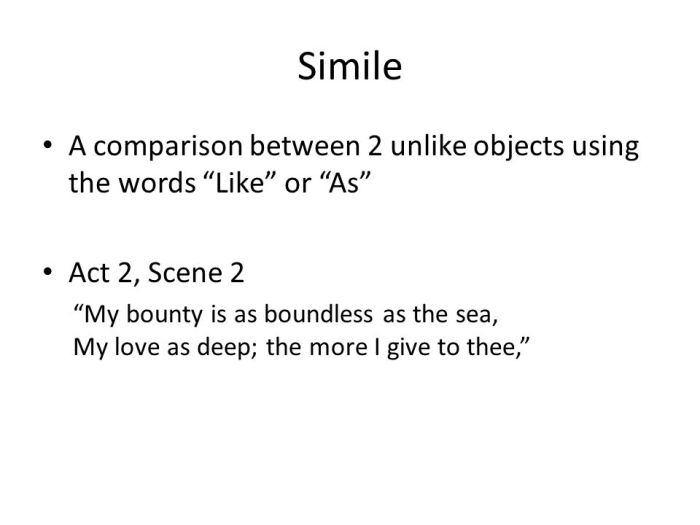Simile romeo and juliet act 2 – In the enchanting realm of Shakespeare’s “Romeo and Juliet,” Act 2 emerges as a tapestry woven with vivid similes, literary devices that paint a vibrant canvas of emotions, themes, and characterization. These comparisons not only enhance the beauty of the language but also illuminate the play’s profound insights into the human experience.
As we delve into the intricate world of Act 2, we encounter a symphony of similes that illuminate the characters’ inner struggles, foreshadow pivotal events, and explore the timeless themes of love, fate, and the fragility of life.
Similes in Romeo and Juliet Act 2
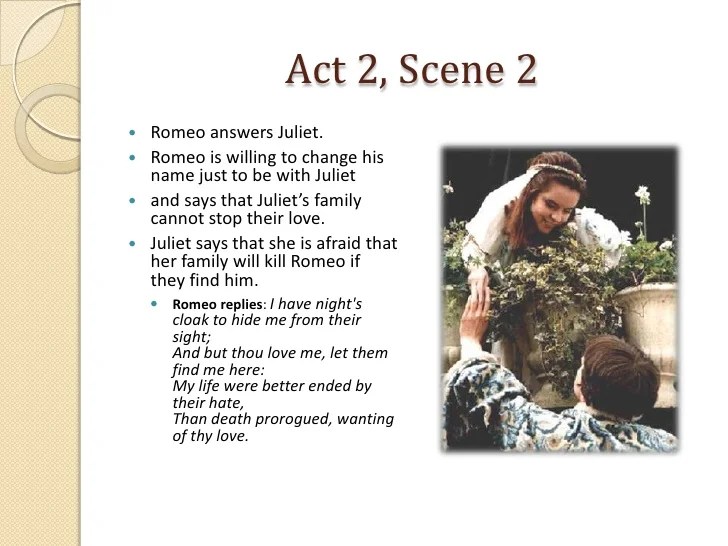
Romeo and Juliet is a tragic play by William Shakespeare that tells the story of two young lovers from feuding families. Act 2 of the play is a turning point in the plot, as Romeo and Juliet meet and fall in love at a party hosted by Juliet’s family, the Capulets.
The act is full of similes, which are literary devices that compare two things using the words “like” or “as.”
Similes are a powerful tool that can be used to create vivid images and make comparisons that are both surprising and insightful. In Romeo and Juliet, Shakespeare uses similes to describe the beauty of Juliet, the passion of Romeo, and the tragic events that unfold.
Similes in Act 2
Here is a list of all the similes used in Act 2 of Romeo and Juliet:
- “Her beauty hangs upon the cheek of night / Like a rich jewel in an Ethiope’s ear.”
- “Did my heart love till now? For I ne’er saw true beauty till this night.”
- “My lips, two blushing pilgrims, ready stand / To smooth that rough touch with a tender kiss.”
- “My bounty is as boundless as the sea, / My love as deep; the more I give to thee, / The more I have, for both are infinite.”
- “The brightness of her cheek would shame those stars, / As daylight doth a lamp.”
- “Her eyes in heaven would through the airy region stream / So bright that birds would sing and think it were not night.”
- “Is she a Capulet? O dear account! / My life is my foe’s debt.”
- “O, she doth teach the torches to burn bright! / It seems she hangs upon the cheek of night / Like a rich jewel in an Ethiope’s ear.”
- “But soft! What light through yonder window breaks? / It is the east, and Juliet is the sun.”
- “Arise, fair sun, and kill the envious moon, / Who is already sick and pale with grief.”
- “Two of the fairest stars in all the heaven, / Having some business, do entreat her eyes / To twinkle in their spheres till they return.”
- “Her voice was ever soft, / Gentle, and low, an excellent thing in woman.”
Analysis of Similes in Act 2
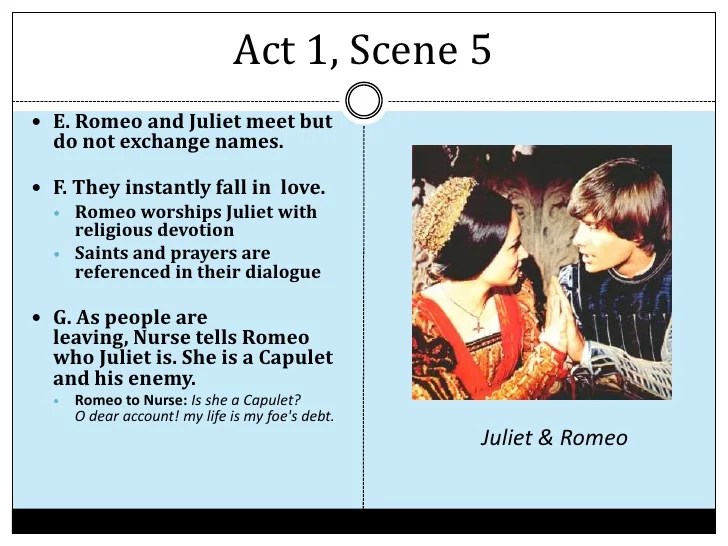
Similes play a significant role in Act 2 of Romeo and Juliet, enhancing the vividness and emotional depth of the play. Through these literary devices, Shakespeare illuminates the characters’ emotions, develops key themes, and advances the plot.
Simile 1: “My bounty is as boundless as the sea” (Act 2, Scene 2)
In this simile, Juliet expresses her boundless love for Romeo, comparing it to the vastness of the ocean. The simile emphasizes the immeasurable and overwhelming nature of her affection, suggesting that her love knows no limits.
Simile 2: “My lips, two blushing pilgrims, ready stand / To smooth that rough touch with a tender kiss” (Act 2, Scene 2)
This simile conveys the tender and passionate nature of Juliet’s first kiss with Romeo. Her lips are depicted as “pilgrims” seeking to soften Romeo’s rough hand, creating an image of devotion and longing. The simile also foreshadows the intensity and significance of their relationship.
Simile 3: “The brightness of her cheek would shame those stars / As daylight doth a lamp” (Act 2, Scene 2)
Romeo’s simile exalts Juliet’s beauty, comparing her radiant complexion to the brilliance of the stars. The simile suggests that Juliet’s beauty surpasses even the celestial bodies, highlighting her exceptional loveliness and the transformative power of love.
Themes Explored through Similes: Simile Romeo And Juliet Act 2
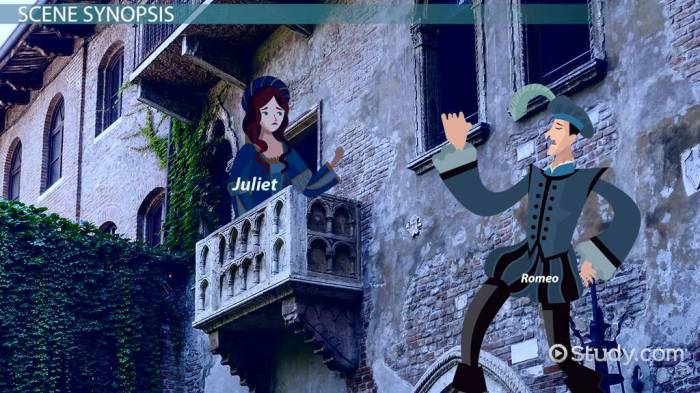
The use of similes in Act 2 of Romeo and Juliet serves to enhance the exploration of several major themes, including love, conflict, and fate.
Love is a central theme in the play, and it is often expressed through similes that compare the characters’ feelings to natural phenomena or objects. For example, Romeo compares Juliet to the sun, saying that she is “more fair than the sun” (2.2.16). This simile suggests that Romeo’s love for Juliet is as bright and warm as the sun, and that she is the center of his world.
Conflict is another major theme in the play, and it is often expressed through similes that compare the characters’ actions to those of animals or objects. For example, Romeo compares Tybalt to a “lion” (2.1.63), suggesting that Tybalt is a fierce and dangerous opponent.
This simile helps to create a sense of tension and suspense, and it foreshadows the tragic events that are to come.
Fate is also a major theme in the play, and it is often expressed through similes that compare the characters’ lives to those of objects that are subject to external forces. For example, Romeo compares Juliet to a “star-crossed lover” (2.1.134), suggesting that their love is doomed from the start.
This simile helps to create a sense of inevitability and tragedy, and it foreshadows the tragic events that are to come.
The love between Romeo and Juliet is often compared to a rose, with its beauty and thorns. Similarly, Andrew Carnegie’s legacy has its pros and cons. Andrew Carnegie pros and cons can be debated endlessly, but his contributions to education and philanthropy cannot be denied.
Just as Romeo and Juliet’s love faced obstacles, so too did Carnegie’s efforts to improve society.
Character Development through Similes
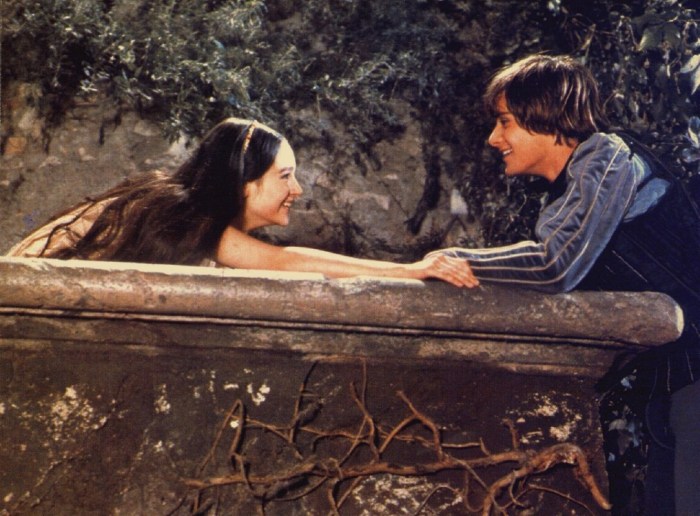
Similes play a crucial role in shaping the characters of Romeo and Juliet. By comparing characters to familiar objects or experiences, Shakespeare reveals their inner thoughts, motivations, and relationships.
Romeo
Romeo is often compared to a lover. For instance, when he first sees Juliet, he says, “Did my heart love till now? For I ne’er saw true beauty till this night.” This simile reveals Romeo’s intense passion for Juliet and his belief that she is the only true love he has ever known.
Juliet
Juliet is often compared to a flower. When Romeo first sees her, he says, “She speaks, yet she says nothing. What of that? Her eye discourses; I will answer it.” This simile suggests that Juliet’s beauty is so captivating that it transcends words.
Her eyes alone speak volumes, revealing her intelligence and inner beauty.
Tybalt
Tybalt is often compared to a beast. For instance, when he challenges Romeo to a duel, he says, “Thou art a villain and thou liest.” This simile reveals Tybalt’s hot-headed and aggressive nature. He is quick to anger and sees Romeo as a threat to his family’s honor.
Plot Development through Similes
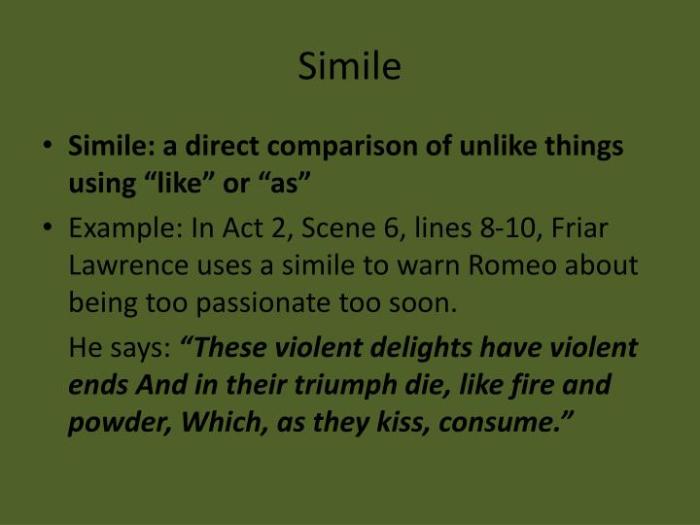
In Act 2 of Romeo and Juliet, similes play a crucial role in foreshadowing events and contributing to the suspense and dramatic tension of the plot. By comparing characters and situations to familiar images, Shakespeare creates a vivid and engaging narrative that keeps the audience on the edge of their seats.
Foreshadowing Events
One of the most striking similes in Act 2 foreshadows the tragic fate of Romeo and Juliet. When Romeo first sees Juliet at the Capulet’s ball, he compares her to “a rich jewel in an Ethiop’s ear.” This simile suggests that Juliet is both beautiful and exotic, but also that her beauty is dangerous and could lead to disaster.
As the play progresses, this foreshadowing becomes increasingly evident, as Romeo and Juliet’s love affair ultimately leads to their deaths.
Suspense and Dramatic Tension, Simile romeo and juliet act 2
Similes also contribute to the suspense and dramatic tension of the plot by creating a sense of anticipation and uncertainty. For example, when Romeo and Juliet first meet, Romeo compares Juliet to “the sun.” This simile suggests that Juliet is both beautiful and radiant, but it also creates a sense of foreboding, as the sun can also be blinding and dangerous.
This foreshadowing adds to the suspense and dramatic tension of the scene, as the audience wonders what will happen next between Romeo and Juliet.
FAQ Overview
What is the significance of similes in Romeo and Juliet Act 2?
Similes in Act 2 enhance the play’s emotional depth, foreshadow events, and reveal the characters’ inner struggles and motivations.
How do similes contribute to character development in Act 2?
Similes associated with each character provide insights into their personalities, relationships, and the complexities of their emotions.
What are some key similes used in Act 2 and their meanings?
Examples include: “My bounty is as boundless as the sea, / My love as deep; the more I give to thee, / The more I have, for both are infinite” (Romeo describing his love for Juliet), and “When he bestrides the lazy-pacing clouds / And sails upon the bosom of the air” (Romeo comparing Mercutio to a graceful bird).
